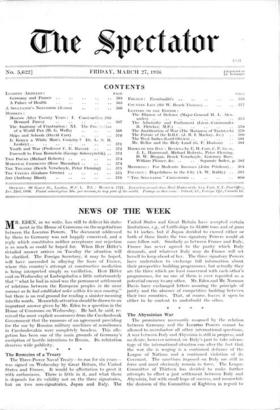The Remains of a Treaty The Three-Power Naval Treaty—to run
for six years— was signed on Wednesday by Great Britain, the United States and France. It would be affectation to greet it with enthusiasm. There is little in it, and what there is depends for its validity not on the three signatories, but on two non-signatories. Japan and Italy. The United States and Great Britain have accepted certain limitations, e.g., of battleships to 35,000 tons and of guns to 14 inches, but if Japan decided to exceed either or both of those limits the two signatory Powers would at once follow suit. Similarly as between France and Italy. France has never agreed to the parity which Italy demands, and whatever Italy may do France will set herself to keep ahead of her. The three signatory Powers have undertaken to exchange full information about. their prospective building programmes, but actually they are the three which are least concerned with each other's programmes, for no one of them is ever regarded as a potential enemy to any other. Mr. Eden and Mr. Norman Davis have exchanged letters assuring the principle of parity and the absence of competitive building between their two countries. That, of course, leaves it open to either to be content to underbuild the other.










































